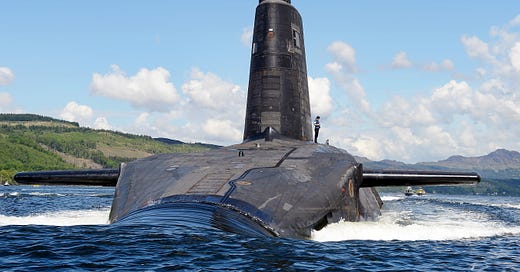The disintegrating international order
Britain's new foreign policy embraces the intensifying contest in international relations
The conservative journalist Ed West once bemoaned the British armed forces’ habit of tweeting out progressive mantras. It is “as if the raison d’etre of the army was to promote inclusivity and LGBT rights,” he wrote, “rather than literally killing foreigners.”
The British policy on whether foreigners should be killed has vacillated over the years, usually along the spectrum of being actively encouraged to being a regrettable necessity. When the Cold War ended in the early 90s, some had even hoped that the killing of foreigners might stop entirely as we embraced a permanent international rules-based order.
History, alas, has not ended, having rudely imposed itself several times in the intervening years. And it is in this context that the British government’s “integrated” foreign policy review has landed, following a year of delays in the wake of the Covid-19 pandemic.
Although the review largely eschews analysing Brexit, it is impossible for anybody reading it not to see it as a our international relations pitch following the European Union exit. It is therefore notable that early on the review states, “Our commitment to European security is unequivocal, through NATO, the Joint Expeditionary Force and strong bilateral relations.” It also says that “the bulk” of British security focus will remain in the Euro-Atlantic.
This is important to bear in mind given the press emphasis on the “tilt” to the Indo-Pacific, which has already been seen in Britain’s application to join what used to be known as the Trans-Pacific Partnership. While China’s increased “assertiveness” and the growing economic importance of the Indo-Pacific is acknowledged, the review repeatedly states that Britain is a European country, even if it has “global interests”.
Although much effort is expended to situate Britain as a champion of liberal democracy and open society, there is also an awareness that the rest of the world is not set an inevitable course to join us. “[The] international order is more fragmented, characterised by intensifying competition between states over interests, norms and values,” the review says.
It adds that the government’s “first and overriding priority is to protect and promote the interests of the British people through our actions at home and overseas.” A British government promoting British interests might not seem so startling, but recent pillars of the establishment have not taken such a partial view of things.
Former civil service chief Gus O’Donnell was once reported to have said he believed his job at the Treasury was to maximise global welfare rather than the national sort. There is compelling ethical argument for such an enlightened view, but one doubts that the Chinese see things the same way.
Such doubt is reflected in the review’s title: “Global Britain in a competitive age”. Although it emphasises the importance of multilateral action and our alliances, the government is in no doubt that we are among rivals and potential enemies, both in Russia, which is outwardly hostile, and China, which is an emerging great power, key trading partner and potentially hostile presence in the Pacific.
It is this context of great power competition that has led the British government to raise its nuclear warhead cap to 260, instead of reducing it to 180 as was planned. As well as keeping information about their deployment and the criteria for use secret, the government will also cease publication of operational stock numbers. The secrecy will complicate rivals’ calculations and “contributes to strategic stability”, the review says.
What many of these high-minded ideas mean in practice remains to be seen. What can be said is that in the wake of Brexit the British government sees the world as increasingly contested between the liberal democracies who thought they’d ended history and the authoritarian states who continue to write it.
Tanks for the memories. Earlier in the week I wrote about the parlous state of the British Army’s armoured vehicle fleet, as was recently flagged by the defence committee. I’ve yet to read the relevant sections of the integrated review, but the emphasis appears to be on procuring shiny new gear rather than replacing our ageing tanks.
A likely story. The excellent Tom Chivers has a piece on a line from the integrated review which claims it is “likely” that a terrorist group will launch a “successful” chemical, radiological, biological or nuclear attack by 2030. Whether that’s scary or not depends on what the government means.
PS. In the excitement of sending this I forgot to add the usual guff about sharing. But please do so if you're reading this in the browser.
Jimmy




